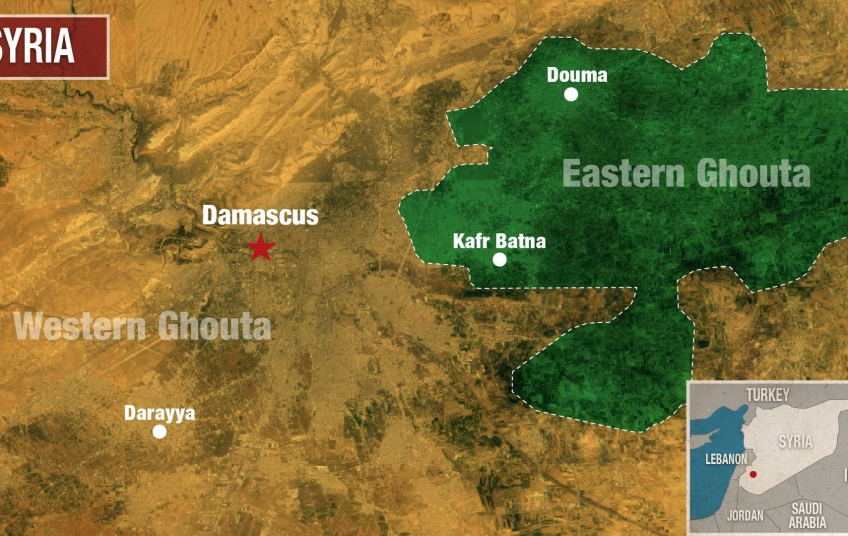The deteriorating situation in Eastern Ghouta
On February 24 the UN Security Council voted to approve a resolution that called for a 30-day ceasefire across Syria. But as Reuters informs, the “Syrian government forces launched a ground assault on the edge of the rebel-held eastern Ghouta enclave, seeking to gain territory.” According to the report, a senior U.S. general accused Moscow of acting as “both arsonist and firefighter” by failing to rein in Assad. The report further notes, that
“the chemical weapons watchdog, the Organisation for the Prohibition of Chemical Weapons, opened an investigation into attacks in eastern Ghouta to determine whether banned munitions were used.
According to another report, U.S. disarmament ambassador Robert Wood said that Russia has violated its duty to guarantee the destruction of Syria’s chemical weapons stockpile and prevent the Assad government from using poison gas.” “For Russia to claim that the Assad regime has eliminated its chemical stockpiles is just absurd. Its continued denial of the Assad’s regime culpability in the use of chemical weapons is simply incredible,” U.S. disarmament ambassador Robert Wood told the Conference on Disarmament. He also added: “Russia needs to be on the right side of history on this issue. It is currently on the wrong side of history,” he said.
U.S State Department spokesperson, Heather Nauert made the following remark during a press conference on March 1: “Russia voted for the UN-sponsored ceasefire. Syria, and its Russian enablers, must stop making excuses and adhere to that.”
Putin flexed his fake muscles
The New York Times writes, that President Vladimir Putin of Russia in his annual state of the nation address “threatened the West with a new generation of nuclear weapons, including what an “invincible” intercontinental cruise missile and a nuclear torpedo that could outsmart all American defenses.” But despite the lavish yet old-fashioned animations of the newly developed weapons, legitimate questions arose about whether these weapons really existed. “Given the recent history of Russian launch failures or premature crashes, the idea that Russia suddenly possessed a new generation of flying weapons strained credulity. Political analysts said it was an effective campaign ploy whether the weapons existed or not,”- says the author. The New York Times quotes Aleksei V. Makarkin, the deputy head of the Center for Political Technologies, a Moscow think tank: “He’s giving people the image of a desired future, of a future for Russia, and that’s appealing for his domestic audience.” Makarkin added: “The reality that the country lacks the money to pay for a giant increase in social spending combined with a new generation of weapons was beside the point.” The article also quotes Max Trudolyubov, a newspaper columnist and political analyst, who called the speech “a modern version of the Czar Cannon, a giant 16th-century piece of armament that sits on the Kremlin grounds and that legend holds never really worked.”
Leonid Bershidsky in his op-ed for Bloomberg states that the “revanche and confrontation continue to drive Putin's agenda. In the meantime, he appears to believe that Russia's internal problems will largely fix themselves if he sets ambitious enough goals. That, regardless of the new weaponry, is a disaster in the making.” The author claims, that “the problem is not so much with the modern weapons -- a country as big as Russia needs military strength -- as with what the weapons are needed to defend. Without a coherent vision of the future or an attractive model for others to imitate, without any soft power to speak of, without an economic model that can ensure sustainable growth or keep people out of poverty, the missile-rattling is a terrifying but hollow sound. In the context of a mock election with a predetermined result, Russia's growing military might means better protection for an unaccountable, oppressive regime that doesn't have to keep any of the promises it makes. It's muscle without hope or substance.” Bershidsky concludes: “Modernizing weaponry is fine as long as the rest of the country also undergoes modernization and sheds the features of a mafia state. That's a tougher job and one Putin knows is required; he just isn't particularly excited about it -- and so Russia is in for another six years of muscle-flexing and stagnation.”
Meanwhile, the U.S. seems to be unimpressed with Putin’s Kim Jong-un style rhetoric. In Nuclear Posture Review the United States acknowledged “more diverse and advanced nuclear-threat environment than ever before, with considerable dynamism in potential adversaries’ development and deployment programs for nuclear weapons and delivery systems.” Therefore, the new NPR “presents the flexible, adaptable, and resilient U.S. nuclear capabilities now required to protect the United States, allies, and partners, and promote strategic stability.” Prior to that, for the very first time, Russia and China were openly named as America’s adversaries in the new National Security Strategy.
And just before Putin’s annual address, John P. Carlin called Russia a rogue state in his article for Politico. Notably, he wrote the following: “Vladimir Putin’s Russia is engaged in a low-intensity conflict not just against the United States, but against the civilized world, where commerce and prosperity are inextricably intertwined with digitally connected machines. Fearing that both democracy and free and fair economies represent an existential threat to his corrupt authoritarian regime, Putin’s Russia is increasingly responsible both for indiscriminate destructive cyberattacks and for harboring cybercriminals who harm the global online economy. It is impossible to confront threats to cybersecurity without addressing the Putin problem.” Carlin also stated that “Putin’s Russia is a rogue actor, and both its government’s behavior and the freedom it provides criminals is making the world less safe. It is operating far outside the bounds of civilized countries online. It’s a problem similar to the rogue behavior we’re seeing from North Korea on nuclear issues—and we need a similar, collective global approach to punish and isolate Russia.”
Putin tries hard to create the visibility of a superpower, but in reality, Russia is nothing but a drug cartel with nuclear arsenal.
Prepared by Marina Muradyan





